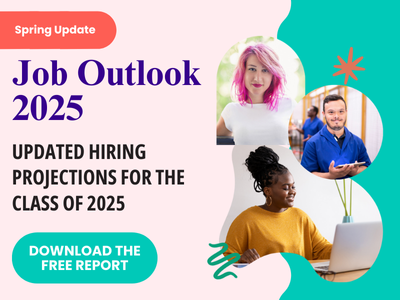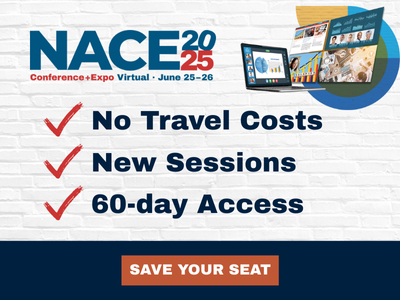In 2015, Yale’s Office of Career Strategy (Yale OCS) began an expansive search for an assessment tool that could work with the breadth of its students’ interests. Ultimately, the Yale OCS team enlisted the help of key partners to create its own tool—the “Designing Your Career” online tool—that incorporates design-thinking principles and is available to everyone, not just Yale students and alums.
“On a practical level, we created the tool to be accessible both in terms of digital accessibility standards and, also, it is housed on an open-access webpage,” explains Jeanine Dames, director of Yale OCS and senior associate dean of Yale College.
“The tool’s ease of use, brevity in explanation, and interactive nature are also all aspects we hope will foster high usage.”
Across Yale, Designing Your Career is being used actively in advising sessions, referred to students by faculty, and being used individually by students and alumni who enjoy its interactive and self-paced nature.
“However,” Dames adds, “our hope is that this tool will reach beyond Yale. As career professionals, we work with some students who are just starting to explore and others who are changing paths because of a variety of reasons. We want this tool to be one of hope for students.
“As they use the tool, we hope they realize that it is okay to not be sure what you want, that it is okay to change your mind, and that it is okay to try something, maybe fail at it, and step back to try something else. Our hope is no matter what stage they are in that the tool helps them chart a path forward.”
Designing Your Career is available through an open-access page on the Yale OCS website.
Addressing needs
Yale is a liberal arts school with 85+ majors. Dames explains that commercial assessment tools were often overly prescriptive and based primarily on skills that may be developed through a major.
“We wanted a tool that would be fluid and would allow our students to enter and re-enter at any step based on their career readiness journey,” she says.
Dames stresses that at Yale, similar to many schools, a student’s major does not determine their career paths.
“We have economics majors working on Broadway and theatre majors working on Wall Street. Many students across majors take at least one computer science and one data science class because they see them as transferable skills,” she says.
“We needed a tool that would work with all those variables. We also wanted a tool that affirmed a student’s personal and professional career goals and aspirations, free of judgment, and that helped them map a path toward achieving those.”
Finally, Dames continues, Yale OCS needed a tool that is flexible and not a “rigid pathway.”
Partnerships and funding
About the same time that Yale OCS was searching for an assessment tool, Bill Burnett and Dave Evans at Stanford University were getting close to publishing “Designing Your Life: How to Build a Well-Lived, Joyful Life.” Dames had an opportunity to meet Burnett on a trip to the West Coast before the book was published.
“I heard firsthand about the vision, the ‘Designing Your Career’ course at Stanford, and the desire to partner with other schools to expand the message,” she recalls.
“The openness of the design-thinking process and its application to the career journey was fascinating to us at Yale OCS, so we sent two staff members to join one of their inaugural training programs and I went to work on finding some funding to help us launch something special at Yale.”
Dames explains that the Hastings Foundation has been a long-time supporter of Yale OCS.
“The Foundation generously gave us a gift to start this exploration, and as we further built the vision, they increased their gift, allowing us to create a more sustainable structure,” she says.
Since 2016, Yale OCS has hosted in-person workshops and online programming for Yale students, as well as training programs for its career services peers in the New England and the Connecticut-New York-New Jersey regions free of charge.
With the increased gift from the Hastings Foundation, Yale OCS further scaled its program, not only for Yale students and alumni, but also for the larger public’s use with the creation of the Designing Your Career tool.
“Stanford University has been an amazing partner throughout this entire journey. The Stanford Life Design Lab has been a thought partner on our ideas and a mentor to our many advisers who have gone through their training. Yale OCS also partnered closely with Stanford’s ITS team and their contract experts to license the use of their original work and allow us to build something unique for Yale.”
Dames credits many partners at Yale who helped make Designing Your Career a reality. Within the career office, Kristin McJunkins led collaboration with Stanford on the creation of this tool, facilitated feedback from our advising team, and managed the external developer who built the tool for Yale.
Meanwhile, the ITS and contract teams at Yale also helped with many nuanced details that were necessary to make the project a success, and its partners in development, particularly Cara Moran, helped Yale OCS secure the gift from the Hastings Foundation.
Designing a useful tool
In its programming over the years, Yale OCS dove into the many modules of Stanford’s course and decided to focus on five key steps for the Yale program:
- Accept;
- Empathize;
- Define
- Ideate; and
- Prototype.
“In making the online tool, we focused on these five steps and further broke down actionable exercises in each one for the user,” Dames notes.
Dames explains that design-thinking principles appealed to Yale OCS and the Hastings Foundation because it is an open concept that allows an individual to tap into their creativity to think about their goals and values and evaluate how those will influence their career choices.
“It is also non-prescriptive; each person going through the steps will create a different path,” Dames says.
“No two paths will look alike and that is how we view our students—no two are alike. We also greatly appreciated the fluidity of being able to move back and forth through the steps, particularly once at the Ideate stage.”
She explains that when a student tries something for the first time, they often realize it isn’t what they expected, and maybe they don’t like it.
“That is an extremely valuable lesson, but may also be frustrating and a little scary for some students who always saw themselves on that one path,” Dames says.
“The design-thinking principles allow for acceptance of change and show it is part of a valuable process, not a failure. That has resonated greatly with our students.”
A tool for all students
Dames says that an important part Yale’s mission is to share its resources beyond campus. The university accomplishes this, for example, through many open library collections, open online courses, and open museum access.
“Yale OCS is proud to further this mission, and our entire website is open for public use unless we are linking to proprietary information,” she points out.
“We invite the world to use Designing Your Career, and we believe it will be helpful to any individual ready to start their career journey or reevaluate their existing path. It is a very personal tool that can be used by an individual on their own, or with the support of a career adviser, peer mentor, faculty member, family member, or a friend.”
Dames says being persistent and seeking and sharing talent and expertise are essential elements in creating a tool such as Designing Your Career.
“We began a journey to find a new self-assessment tool in 2015 and decided to create the online tool in 2019, but like so many things, the pandemic delayed our efforts,” she says.
“Getting back on track was key, and we are grateful for our many partners along the way.”
Designing Your Career is available through an open-access page on the Yale OCS website. Users can also link to it from any page of the Yale OCS website by clicking the button at the top of each page titled “Designing Your Career.” Dames encourage fellow career professionals to contact her at jeanine.dames@yale.edu if they have comments or suggestions for how we to improve the tool.







